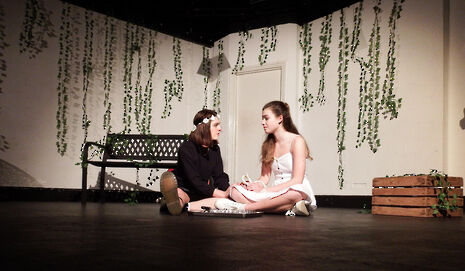Techno Electra review
An ambitious modernisation of Sophocles’s tragedy that doesn’t quite do justice to the original

Sophocles’ Elektra is thought to be one of his later tragedies, and takes place after the death of Agamemnon. On his return from the Trojan War Agamemnon has been killed by his wife, Clytemnestra, and her lover Aegisthus, in revenge for the sacrifice of their daughter Iphigenia before the war, in compliance with the gods’ demands. Now Electra, sickened by her mother’s actions, waits eagerly for the return of her brother, Orestes, believing he will see that justice is carried out. On his return, however, Orestes and his companions pretend that he has been killed, and Electra, feeling more alone than ever, hatches a plan to take her own revenge.
While it may sound as though I’m nit-picking, good poetry is indispensable to a verse play
Aidan Tulloch’s rewrite modernises the text. The last few decades have seen several Greek tragedies rewritten (I was reminded most strikingly of Liz Lochhead’s Medea) with varying degrees of success, and I’m afraid, for me, Tulloch’s adaptation proved more off-putting than illuminating. Verse plays are notoriously difficult to write, but I repeatedly found myself distracted by Tulloch’s heavy-handed poetics. Rhyming couplets should always be deployed with extreme caution, and unmitigated strings of them quickly become either grating or comic, often both. More frustratingly, a number of these couplets failed to scan properly (the forced iambic rhythm of ‘CHA-per-ONE’ was particularly untidy).
In addition to this, Tulloch’s script appeared largely indifferent to the issue of tone, compromising its more intense moments. The description of Orestes’ pretend death was genuinely engaging, only to be let down by the tricolon of ‘trampled, mutilated, squashed’. And while it may sound as though I’m nit-picking, good poetry is indispensable to a verse play. There were some charmingly comic moments, but on the whole, I couldn’t help wishing Tulloch had enlisted the help of a better-read editor to cast an eye over it, or just had simply not attempted to work in verse. A pared down script might have retained the modern setting’s immediacy without feeling quite as clumsy.
This also would have made things easier on the actors. Dealing with rather indifferent verse creates challenges for the best of actors, and some members of the cast noticeably struggled more than others. Lola Miller as the Chorus Leader perhaps fared best, her wry tone adding a nice touch of irony, while Alice Murray as Clytemnestra was able to draw out both the humanity and the humour behind her lines. Agnelle Groombridge as Electra herself was more variable; while she is undoubtedly watchable and evidently relished her more sulky teenage moments, I was never convinced that her hatred was bitter enough to lead to actual violence. Ananya Mishra as Orestes was nicely energised, but again, could have done with a little more fierceness.
Ella Gold’s direction was another force the actors had to contend with. While there were some clever choices, such as having the chorus onstage at all times, even before the action began, the blocking was largely careless. Occasional instances of masking were less of an issue, but there was altogether too much wandering for my taste, and similarly too much of take-a-step-every-time-you-speak style blocking. Again, moments of comedy shone, exhibiting more directorial care, but these moments of laughter bled into moments of tragedy, particularly at the tragic conclusion, giving the murders a slapstick feel.
The final chorus was poignant, complemented by Tulloch’s dynamic score and Olivia Railton’s thoughtful use of lighting, but this ultimately wasn’t enough to make Techno Electra feel as electrified as it should have. Somewhere between comic and tragic, this ambitious project makes for an interesting evening of theatre, but don’t expect the intensity you’d get even from just reading the Sophocles.
 Interviews / You don’t need to peak at Cambridge, says Robin Harding31 December 2025
Interviews / You don’t need to peak at Cambridge, says Robin Harding31 December 2025 News / Unions protest handling of redundancies at Epidemiology Unit30 December 2025
News / Unions protest handling of redundancies at Epidemiology Unit30 December 2025 Comment / What happened to men at Cambridge?31 December 2025
Comment / What happened to men at Cambridge?31 December 2025 Features / ‘Treated like we’re incompetent’: ents officers on college micromanagement30 December 2025
Features / ‘Treated like we’re incompetent’: ents officers on college micromanagement30 December 2025 Theatre / We should be filming ADC productions31 December 2025
Theatre / We should be filming ADC productions31 December 2025









